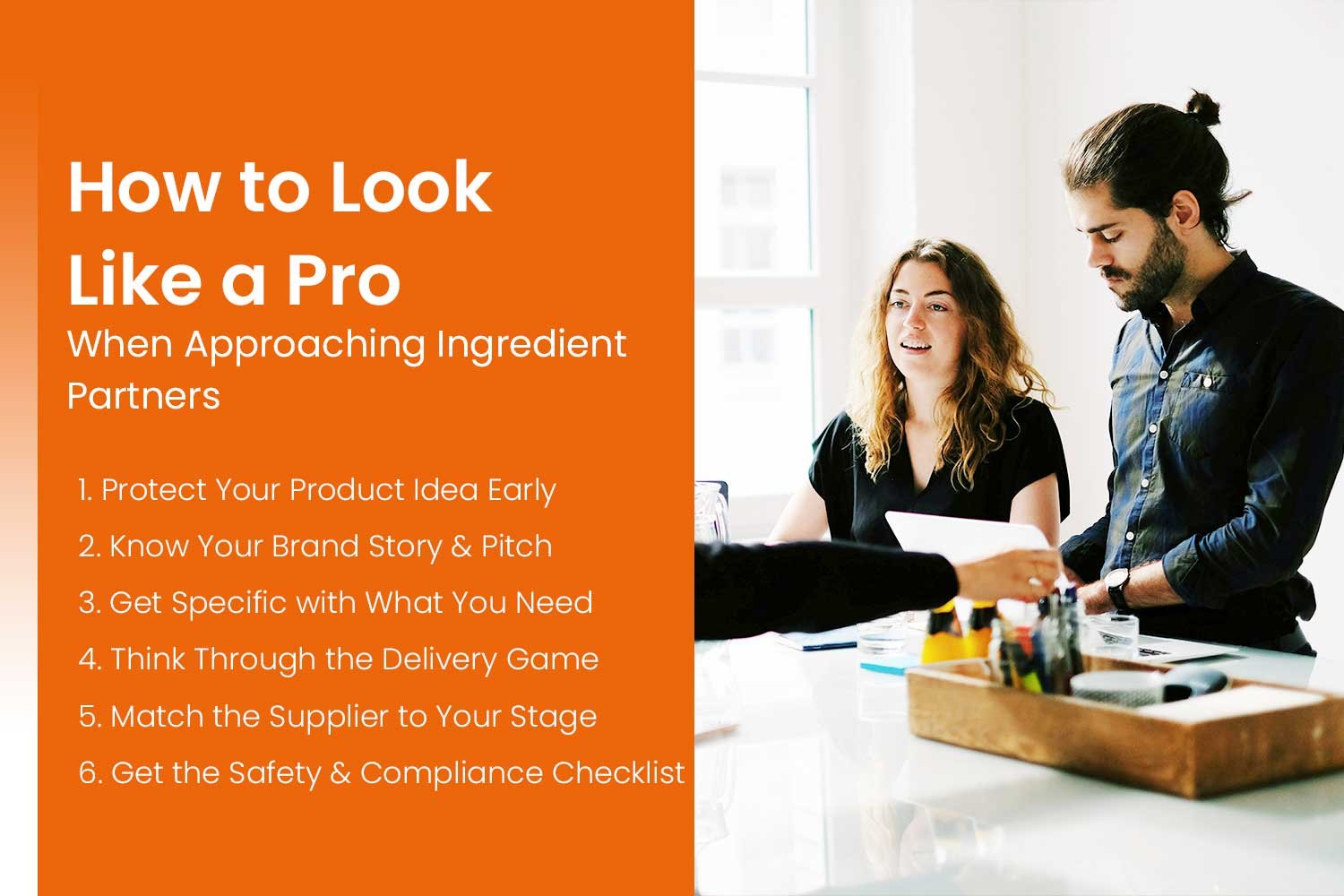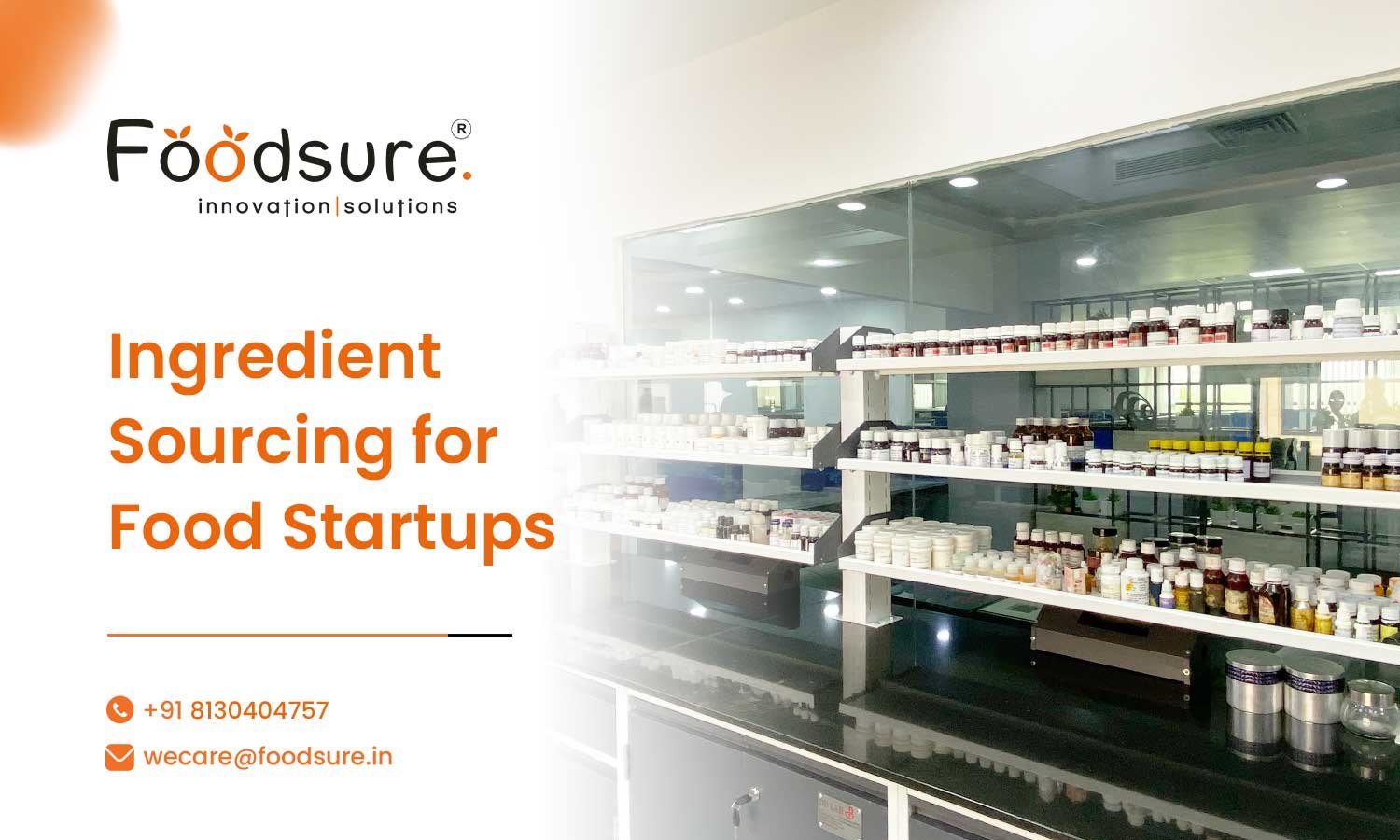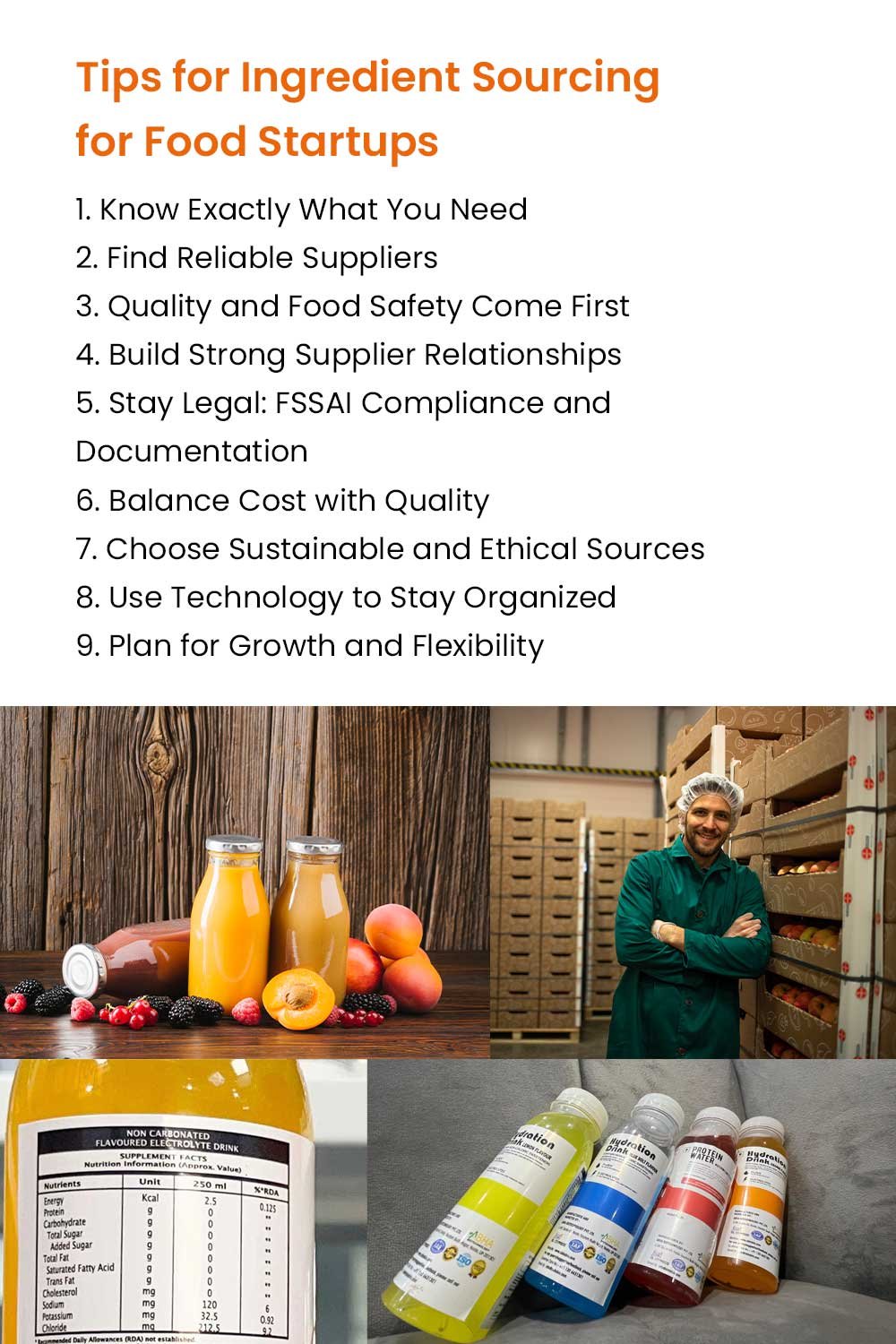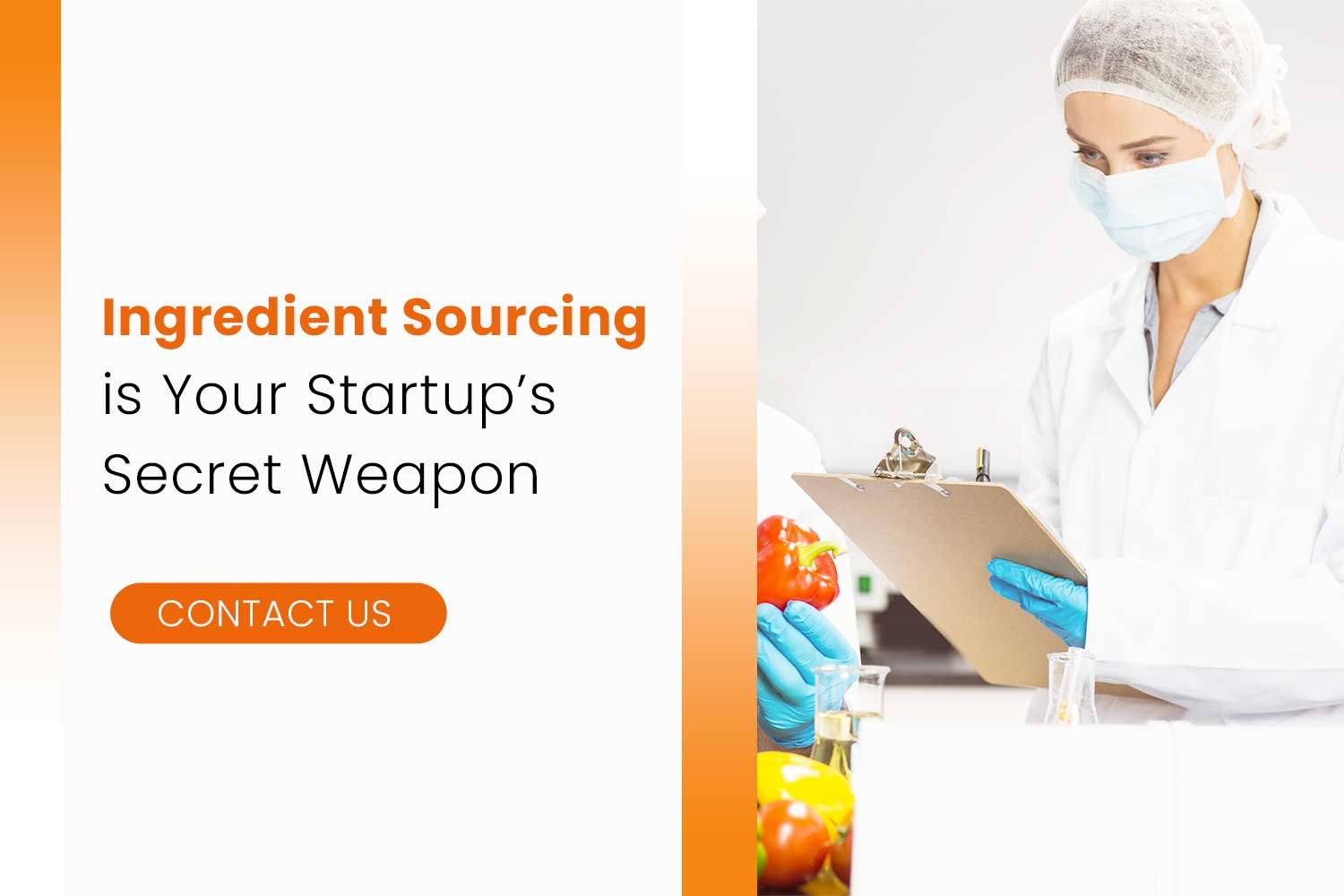Starting a food business is a big risk, and to make it clean and sorted, food startups must take powerful steps. Mainly, in ingredients sourcing for food startups, because this is the crucial step for food brand business success. They usually juggle about how to source ingredients for a food business. So the one thing you should take care of from day one: your ingredients. What you use, where it comes from, and how reliable it is can make or break your product. Ingredient sourcing for food startups isn’t just about finding the cheapest option. It’s about choosing quality that keeps your product safe, tasty, and perfect every time.
This blog breaks down Ingredient sourcing for food startups into simple, actionable steps. Take these steps into consideration and see the winning game. No matter if you are making snacks, beverages, baked goods, or ready-to-eat meals, these tips will help you avoid common mistakes, save money, and create products your customers love. Get the excellent ingredients sourcing tips for food startups now.
1. Know Exactly What You Need
The best ingredients sourcing tips for food startups are to study well about the brand. Before you start talking to suppliers, write down exactly what ingredients you need for your product. Don’t just say “flour” or “spices.” Be clear—what kind of flour? Which spices? Do you need it to be organic or without preservatives? Go so easily and clearly with your vision and work accordingly.
Why is this important?
Being clear from the beginning saves you from confusion, last-minute changes, and expensive mistakes. It also makes it easier to compare suppliers and get exactly what your recipe needs. Take action now, and we can help you.
2. Find Reliable Suppliers
How to source ingredients for a food business, the best way is through trustworthy findings. Not all suppliers are created equal. Some deliver on time, provide high-quality ingredients, and follow food safety rules. Others might cut corners or deliver inconsistent products. Here’s how to find the good ones:
- Ask for recommendations: Talk to other food business owners or join industry groups online.
- Check certifications: Look for suppliers with FSSAI registration, ISO, HACCP, or organic certifications.
- Visit local markets: For fresh produce, dairy, or specialty items, local suppliers can be a great choice.
- Order samples: Always test ingredients before placing a big order. Check for taste, smell, texture, and freshness.
Why this matters:
Reliable food ingredients suppliers help you avoid delays, shortages, and quality issues. They also become valuable partners as your business grows, sometimes even helping with new product ideas or better pricing.
3. Quality and Food Safety Come First
A beverage consultant can help you source the best ingredients for food startups. Never compromise on food safety main key points of Ingredient sourcing for food startups. Your customers trust you to deliver safe, healthy products. Here’s how to make sure your ingredients are up to standard:
- Ask for Certificates of Analysis (COA): This document proves that the ingredient meets safety and quality standards.
- Do regular checks: Inspect every batch for freshness, color, and smell. If something seems off, don’t use it.
- Store ingredients properly: Follow storage instructions to prevent spoilage or contamination.
- Keep records: Note down supplier details, batch numbers, and test results. This helps trace problems if they ever arise.
Why this matters:
Food safety issues can ruin your reputation, cause recalls, or even shut down your business. Quality control protects both your customers and your brand.
4. Build Strong Supplier Relationships
Treat your suppliers as partners, not just vendors. Good relationships lead to better deals, priority service, and honest communication.
- Communicate clearly: Share your needs, timelines, and feedback regularly.
- Pay on time: This builds trust and helps you negotiate better terms in the future.
- Have backup suppliers: Don’t rely on just one source for key ingredients. If one supplier has a problem, you won’t be left stranded.
Why this matters:
Strong relationships mean fewer surprises, more flexibility, and better support when you need it most.
5. Stay Legal: FSSAI Compliance and Documentation
Every food startup in India must follow FSSAI rules; these are the best ingredients sourcing tips. This means your ingredients—and your suppliers—must be compliant.
- Check FSSAI licenses: Only buy from suppliers who are registered with FSSAI.
- Keep paperwork ready: Store all licenses, test reports, and supplier contracts in one place.
- Label correctly: Make sure your product labels list all ingredients and highlight allergens as per FSSAI rules.
Why this matters:
FSSAI compliance isn’t optional for food startups’ ingredient sourcing. It keeps your business legal, protects consumers, and avoids fines or shutdowns.
6. Balance Cost with Quality
It’s tempting to choose the cheapest supplier, especially when you’re just starting. But low prices can mean lower quality, hidden costs, or unreliable service.
- Compare prices: Get quotes from at least three suppliers for each ingredient.
- Look at the total cost: Factor in shipping, storage, and minimum order quantities.
- Negotiate smartly: If you plan to order regularly, ask for better rates or payment terms.
Why this matters:
Paying a little more for better quality can save you money in the long run by reducing waste, returns, and customer complaints. And the best tips for food startups’ ingredient sourcing
7. Choose Sustainable and Ethical Sources
More and more customers want to know where their food comes from. Food ingredient sourcing sustainably and ethically isn’t just good for the planet—it’s good for your brand.
- Ask about sourcing: Choose suppliers who use fair labor, avoid harmful chemicals, and support local farmers.
- Look for certifications: Organic, Fair Trade, and Rainforest Alliance are some examples.
- Share your story: If you’re sourcing responsibly, tell your customers! It builds trust and loyalty.
Why this matters:
Ethical food ingredient sourcing can set your brand apart and attract loyal, conscious customers.
8. Use Technology to Stay Organized
Managing ingredient sourcing can get complicated fast. Use simple digital tools to keep track of orders, inventory, and supplier performance.
- Spreadsheets: Track what you ordered, from whom, and when it arrives.
- Inventory apps: Get alerts when you’re running low on key ingredients.
- Supplier scorecards: Rate suppliers on quality, delivery, and service to make better decisions.
Why this matters:
Staying organized helps you avoid running out of stock, over-ordering, or missing important deadlines.
9. Plan for Growth and Flexibility
As your startup grows, your ingredient needs will change. Plan so you can scale smoothly.
- Choose suppliers who can grow with you: Ask if they can handle bigger orders in the future.
- Anticipate seasonal changes: Some ingredients may not be available year-round. Have alternatives ready.
- Stay flexible: Be open to changing suppliers or ingredients if your needs or the market change.
Why this matters:
A flexible food ingredient sourcing plan helps you adapt to new opportunities, market trends, or unexpected challenges.
Read More: The Art and Science Of Food Formulation
How to Look Like a Pro When Approaching Ingredient Partners
1. Protect Your Product Idea Early
Before you share your recipe, process, or business model, make sure your idea is protected. Have a basic confidentiality agreement (like an NDA) ready to go. This shows your food ingredient suppliers are professional and gives you peace of mind that your innovation won’t walk away.
2. Know Your Brand Story & Pitch
Food ingredient suppliers don’t just want to know what you’re making—they want to know why it matters. Be ready with a short, clear pitch:
- What’s your product?
- Who is it for?
- Why will it succeed?
When you speak with clarity, you build trust fast—and show that you’re planning for scale, not just a single batch.
3. Get Specific with What You Need
Don’t approach suppliers saying, “I need a natural sweetener.” Instead, come with:
- A clear list of ingredients
- Specifications (organic, non-GMO, etc.)
- Target quantities for sampling and production
This helps food ingredient suppliers check availability and quote faster. It also saves you from the back-and-forth that slows down product development.
4. Think Through the Delivery Game
Where is the supplier located? Do they offer door delivery, or is it factory pickup? How often can they ship?
Be ready to talk:
- Shipping methods (ambient, cold-chain?)
- Lead times
- Warehousing/storage needs
This makes a big difference, especially if you’re working with fresh ingredients, imported goods, or products with short shelf lives.
5. Match the Supplier to Your Stage
A food ingredient supplier that works with multinationals may not fit a startup order size, and that’s okay. Find partners who are aligned with your current scale and open to growing with you.
Ask upfront about:
- Minimum order quantities (MOQs)
- Sample availability
- Payment terms
This filters out poor fits and helps you build relationships with suppliers who truly want to see you grow.
6. Get the Safety & Compliance Checklist Right
Ask for proper documentation that proves their ingredients are safe, legal, and high-quality. This includes:
- FSSAI certification
- Certificates of Analysis (COA)
- Allergen statements
- Third-party audit certifications (like FSSC 22000 or BRC)
- Organic/Kosher/Non-GMO (if needed)
This isn’t just about paperwork—it’s about protecting your brand from future recalls or regulatory issues.

Learn from Real Food Startup Stories
Real Example:
A snack startup in Mumbai started by buying nuts from just one local seller. At first, things were fine. But as more people started buying their snacks, the seller couldn’t keep up, and the quality got worse. So, the founders found two more sellers, asked them to show proof of good quality, and began testing every batch of nuts. They also made a simple spreadsheet to track what they ordered and what they had in stock.
What they learned:
Always keep extra suppliers ready, check the quality every time, and stay organized from the start. It saves a lot of trouble later.
Ingredient Sourcing is Your Startup’s Secret Weapon
Ingredient sourcing for food startups is more than a behind-the-scenes task—it’s a key part of your business success. Choose reliable suppliers, focus on quality and safety, stay compliant with FSSAI, and build strong relationships. Set your startup up for smooth operations and happy customers. Need help? Call us at +91 8130404757 and get ready to shine.
Start smart, stay organized with Foodsure. Make sourcing your strength! Your customers—and your business—will thank us.
FAQs
1. How do food startups find reliable ingredient suppliers in India?
The best way to source ingredients is to:
-
Work only with FSSAI-licensed suppliers
-
Check for certifications like HACCP, ISO, or Organic
-
Always test samples before bulk orders
-
Keep 2–3 backup suppliers to avoid shortages
This ensures consistent quality, safety, and supply security—which is crucial for scaling a food startup.
2. What documents should I ask for from ingredient suppliers?
Food startups must always collect:
-
FSSAI license copy of the supplier
-
Certificate of Analysis (COA) for safety & quality
-
Allergen declarations
-
Third-party audit certifications (HACCP, FSSC, BRC) if available
These documents protect your startup from compliance issues, recalls, and regulatory penalties.
3. How can startups balance ingredient cost with quality?
Don’t just chase the cheapest supplier. Instead:
-
Get quotes from 3 suppliers to compare
-
Check hidden costs like shipping & storage
-
Negotiate better terms for long-term orders
-
Invest in slightly higher quality to reduce waste and customer complaints
This way, startups save money in the long run while keeping products safe and premium.




















